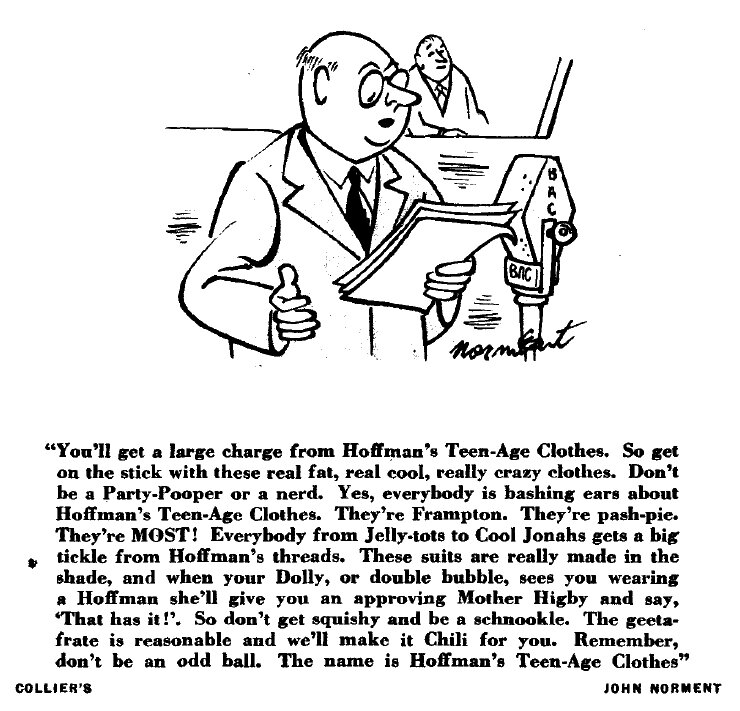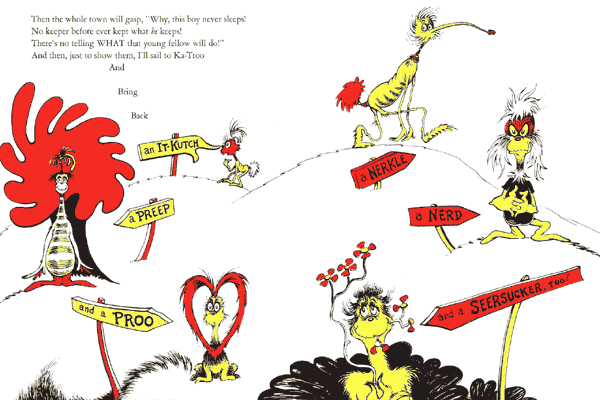8 June 2021
A nerd is a socially inept, often highly intelligent—particularly within a narrow technical field—and otherwise thoroughly conventional person. The slang term makes its appearance in the United States during the early 1950s, but its origin is otherwise mysterious. We simply don’t know where it comes from.
The earliest known use in print is from an article on teen slang in the weekly (physical/paper) news magazine Newsweek from 8 October 1951:
Nerds and Scurves: In Detroit, someone who once would be called a drip or a square is now, regrettably, a nerd, or in a less severe case, a scurve.
The next known appearance is a few days later in a Melbourne, Australia newspaper. But this appearance is again in an article about U.S. teen slang, and the Australian article appears to be heavily cribbed from the Newsweek piece. So, this appearance doesn’t add anything new and doesn’t represent the word having made it Down Under:
“Corny,” “solid,” and “in the groove” are out today. That is they’re “real nothing.”
Teenagers in New York, Chicago, New Orleans, and Los Angeles who resort to such passe expressions are mere peasants or “nerds.”
Another early appearance is in a cartoon in Collier’s magazine from 2 February 1952. In the cartoon by John Norment, a radio announcer uses nerd in advertising copy for teen clothing:
You’ll get a large charge from Hoffman’s Teen-Age Clothes. So get on the stick with these real fat, real cool, really crazy clothes. Don’t be a Party-Pooper or a nerd. Yes, everybody is bashing ears about Hoffman’s Teen-Age Clothes. They’re Frampton. They’re pash-pie. They’re Most! [...] The geetafrate is reasonable and we’ll make it Chili for you. Remember, don’t be an odd ball. The name is Hoffman’s Teen-Age Clothes.
We don’t know where nerd comes from, but that doesn’t mean there aren’t hypotheses and speculations about its origin. One of the more plausible, but still probably wrong, ones is that nerd appears as a nonsense name for a strange creature in the 1950 children’s book If I Ran the Zoo by Dr. Seuss (Theodore Geisel). The idea is that this nonsense word wormed its way into teen-age consciousness and was assigned its present meaning there. The passage from the book reads:
And then, just to show them, I’ll sail to Ka-Troo / And / Bring / Back / an IT-KUTCH / a PREEP / and a PROO / a NERKLE / a NERD / and a SEERSUCKER, too!
But this hypothesis is questionable at best. Seuss’s nerd has no semantic connection to the slang term. And given that the first print use is in the thoroughly conventional Newsweek a year later, it is likely that nerd had already been in oral use by teens for several years when Seuss published this book. It is more likely that Seuss picked a word that he had heard in use and unconsciously registered it rather than that teens acquired it from his book—a book that most teens in 1950 hadn’t read as it was intended for much younger children. And even more likely is that Seuss’s use of nerd is entirely coincidental.
Another hypothesis is that nerd is a variation on the name Mortimer Snerd, one of ventriloquist Edgar Bergen’s puppets. But Snerd was a hillbilly character of low intelligence, so the character doesn’t fit with the early senses of nerd.
Other proffered explanations run afoul of the spelling. It is often suggested that nerd is a play on turd. This is plausible, but the early spellings are overwhelmingly with an <e>, which works against this idea. Similarly, some contend that nerd is a respelling of drunk backwards. Again, there are no early spellings of the word as knurd, nor are any of the early uses associated with alcohol.
The earlier slang exclamation nertz! or nerts! is sometimes pointed to as a possible origin, but again, there is no logical or semantic connection.
One explanation that we can dismiss outright is that nerd is an acronym for Northern Electric Research and Development Laboratories in Ontario. There is a logical connection in that one would expect a lab to be full of nerds, but one should always be suspicious of proposed acronymic origins, and in this case Northern Electric (now Nortel) didn’t establish their R&D labs until 1959, well after nerd was firmly ensconced in the slang lexicon.
The best explanation for nerd that I have heard comes from linguist Arnold Zwicky, as quoted by Ben Zimmer. Zwicky says that words like nerd “don't necessarily have a historical source of the ordinary sort.” They can be “distant echoes of an assortment of existing words.” In other words, a bit of nertz, a dash of Snerd, a whiff of turd, and you end up with nerd.
Sources:
Geisel, Theodore (Dr. Seuss). If I Ran the Zoo. New York: Random House, 1950.
Green’s Dictionary of Slang, 2021, s.v. nerd, n.
“Jelly Tot, Square Bear-Man!” Newsweek, 38.15, 8 October 1951, 28. ProQuest Magazines.
Norment, John, Cartoon. Collier’s Weekly, 2 February 1952. The Unz Review.
Oxford English Dictionary, third edition, December 2020, s.v. nerd, n.
“U.S. Teen-Agers Talk a ‘Cool, Shafty’ Language. The Age (Melbourne, Australia), 11 October 1951, 4. Google News.
Zimmer, Ben. “Birth of the Nerd: The Word; the Mysterious Origins of a Familiar Character.” Boston Globe, 28 August 2011, K2. ProQuest Newspapers.
Image credits: John Norment, Collier’s Weekly, 2 February 1952, 39. Theodore Geisel, 1950, If I Rand the Zoo. Fair use of a copyrighted images to illustrate the topic under discussion.


